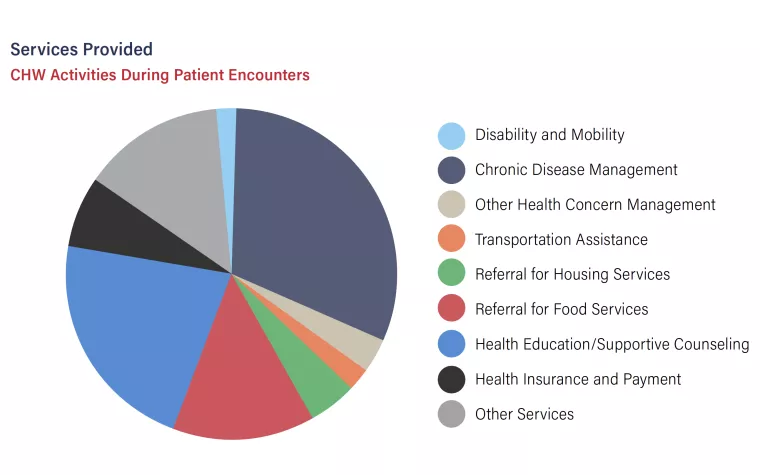Strong social support, access to health-supporting resources, and routine navigation of health care and other service systems are all crucial to maintaining good health while living with diabetes. Community Health Workers (CHWs) can help improve health outcomes by serving as a community-based partner working with individuals based on their own specific context, needs, and strengths. Evidence shows that interventions engaging CHWs are cost effective and improve outcomes related to both diabetes prevention and management.1 Based on this evidence, current recommendations to close gaps in diabetes care include building the capacity of CHWs by providing specialty training in diabetes prevention and management and increasing opportunities for CHWs to be integral community-based members of diabetes care teams.2 That is why DFSC is investing in an initiative to build the capacity of Federally Qualified Health Centers (FQHCs) across the state to improve their efforts in the prevention and management of diabetes through integrating CHWs into their organizations and care models.
The Center for Community Health Alignment (CCHA) will be coordinating this effort. Housed in the University of South Carolina Arnold School of Public Health, the Center’s mission is to use evidence-based models and meaningful engagement strategies to create solutions with community leaders that address health inequities. A foundational part of CCHA’s work is to provide training and development opportunities for CHWs and capacity building guidance to organizations seeking to incorporate community health workers into their operations. Through this project, the Center will develop a CHW diabetes prevention and management curriculum and model and and to provide ongoing coaching and technical assistance to the FQHCs participating in the project on best practice implementation.
The FQHCs selected to participate in the project are:
- Affinity Health Center
- Beaufort Jasper Hampton Comprehensive Health Services
- CareSouth Carolina
- HopeHealth
- Tandem Health
Each site will be integrating community health workers into their care teams serving patients with diabetes. They will also participate in collaborative learning opportunities and receive ongoing training and technical assistance from the Center for Community Health Alignment. The South Carolina Primary Health Care Association (SCPHCA) and the Center for Rural and Primary Healthcare at the University of South Carolina School of Medicine will also be partnering to provide evaluation support for the project.
After CHW intervention at all five sites, patients with uncontrolled diabetes had lower hemoglobin A1C levels.
Citations
1Jacob V, Chattopadhyay SK, Hopkins DP, et al. Economics of community health workers for chronic disease: findings from Community Guide systematic reviews. American Journal of Preventive Medicine. 2019;56(3):e95-e106.
2Chan, J., Lim, L., Wareham, N., et al. The Lancet Commission on diabetes: using data to transform diabetes care and patient lives. The Lancet. 2020; published online Nov 12. https://doi.org/10.1016/S0140-6736(20)32374-6

[The CHW] was great. We talked about all the things I need to implement into my lifestyle. We bounced ideas off each other to improve my health through food and exercise.